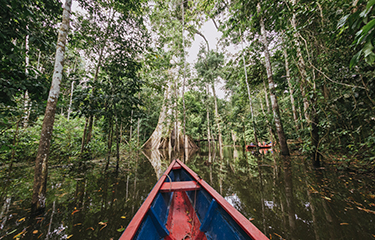ASC helping “safeguard the world’s remaining mangroves” via new fund

A new fund aims to incentivize local communities in Ecuador to conserve mangrove forests.
The Coastal Habitat Stewardship Fund, which was announced on Monday, 26 July, coinciding with International Day for the Conservation of the Mangrove Ecosystem, is supported by the partnership of the Aquaculture Stewardship Council, Conservation International, and Ecuador’s Ministry of Environment, Water, and Ecological Transition. It will be overseen by Socio Manglar, a conservation incentives program implemented by Ecuador’s government.
Currently, Socio Manglar incentive agreements cover more than 37,000 hectares of mangrove forests, with 26 local organizations across three provinces in Ecuador managing investment plans and 4,000 people directly benefitting from the program.
Mangroves, which sequester carbon from the atmosphere, prevent coastal erosion, and provide habitat to countless species, face several threats from various human activities and industries, ASC said. Among these is instensive shrimp farming, ASC said, although “other activities are equally significant such as the use for fuel, construction material, and land-clearance to make way for hotel development and other tourism activities.”
An underlying cause for most mangrove destruction is “a lack of economic alternatives for local communities, which this new fund aims to tackle,” ASC said. Set up as a trust, the fund will require further fundraising down the road and is intended to support Socio Manglar’s work indefinitely.
According to ASC, the fund “is a first for any aquaculture certification body” and signifies a new chapter for the organization and its “engagement in proactive environmental projects, which will compliment and run alongside its certification work.”
“ASC has a long-standing commitment to the protection of mangrove forests through the stringent requirements in our shrimp standard, which prohibits deforestation,” ASC CEO Chris Ninnes said. “We are dedicated to ensuring that shrimp farming is done responsibly and in a manner that conserves blue carbon ecosystems and supports the communities’ dependent on them. As the leading certification programme for environmentally and socially responsible farmed seafood, we think it is our responsibility to now extend our work to areas complimentary to farm certification and this is the first in a number of projects we will undertake to do so.”
CI-Ecuador Vice President and Executive Director Luis Suárez said the potential of partnerships like the one behind the Coastal Habitat Stewardship Fund is considerable.
"We believe a bigger impact is possible through innovative partnerships among the private sector, local communities, national authorities, and environmental organizations. The Coastal Habitat Fund is an innovative financial mechanism to bring support from the aquaculture sector to enhance the financial sustainability of the conservation incentives program,” Suárez said.
Socio Manglar is primarily concerned with environmental and human wellness, Nancy Serrade, manager of the Socio Bosque program at the Ministry of Environment, said.
“Since its creation it has generated multiple benefits for the conservation and restoration of mangroves, and fostered sustainable productive development for local communities who depend on mangroves for their livelihoods,” Serrade said.
These facets are also integral to the new fund.
“The Coastal Habitat Stewardship Fund is an incentive-based program which aims to have both environmental and socio-economic impacts. Efforts have been made around the world to educate local people about the importance of mangrove forests, however when local residents have no alternative means to earn income the areas may be cleared out of economic necessity. In return for voluntarily committing to Socio Manglar’s sustainable use and custody agreements to protect and maintain mangrove forests, local residents are given annual payments as well as access to the forests. The funding from ASC will go towards expanding the scheme and securing its ongoing viability,” ASC said.
The first phase of the project will be “focused on the protection of intact mangrove areas,” and as it expands, “a greater emphasis will be placed on restoration work to help repair deforested areas,” ASC said.
“The program also includes education and resources for local residents and numerous industries, including those that farm both the land and the coastal waters, on the importance of conserving mangrove forests," the organization said. "Currently, there are 30 ASC-certified shrimp farms in Ecuador, all of which have committed to protecting the local ecosystem as a condition of achieving certification."
While shrimp farming is not solely responsible to the depletion of mangroves, ASC said poor aquaculture practices can lead to their loss. ASC’s shrimp standard bars farms established after 1999 from achieving certification if mangroves were destroyed as a result of their siting and, in some cases, requires the replanting of previously destroyed forests by farms in operations before 1999 as a condition of certification, the organization said.
As the “only certification scheme that has gone beyond farm level improvements to safeguard the world’s remaining mangroves,” ASC hopes its actions will inspire other companies and organizations to do the same.
“We very much hope that our initial and ongoing commitment to such projects will be a catalyst for other companies engaged with the ASC to also support us in this work,” Ninnes said. “As we all face up to the collective challenge of redressing climate impacts the ASC is committed to developing further initiatives to help everyone involved in aquaculture to play their role in doing this. This is why we are developing a number of tools to calculate sector greenhouse gas emissions so that we can better understand the scale of our impacts and the mitigation needed to be carbon-neutral. The first of these will be piloted later this year.”
The Food and Agriculture Organization of the United Nations in its 2020 Global Forest Resources Assessment found over a million hectares of mangrove forests were destroyed globally over the past thirty years, including around 30,000 hectares lost in Central America.
Photo courtesy of oscar garces/Shutterstock





Share